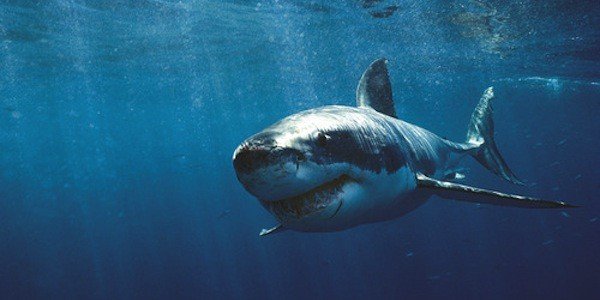Sharks Are Awesome Hunters, Even When Humans Mess With Their Senses

Sharks are both terrifying and fascinating creatures. They're pretty ruthless when it comes to hunting down prey, and once they have engaged with a meal, it's hard to escape. Still, there have always been theories on ways to distract a shark or prevent them from finding prey. Despite this, a recent study found that it's actually a lot more difficult to stop a shark from hunting down its prey, even when its senses are hampered.
According to Discovery, a recent study aimed to figure out exactly how sharks hunt their prey. The researcher team, lead by Jayne Gardiner, wanted to test how sharks use multiple senses in one fell swoop rather than how they use a single sense. The researchers chose three species of shark-- bonnethead, nurse and blacktip sharks--to study at the Mote Marine Laboratory in Sarasota, Florida. The facility was well-prepped for the sharks, allowing the research team to simulate and observe in almost real life conditions.
The tank where the sharks were studied was a flow channel. A cage containing their prey, either pinfish or shrimp, was tethered to the opposite end heading upstream. The sharks were released and sped down the 7-foot-wide channel to nab their meal. Sometimes the sharks could reach their prey in as little as 10 seconds, but they were allowed up to 10 minutes to complete each run.
In round one of the experiment, the sharks didn't have any senses blocked. The next rounds involved blocking the sense of smell or vision in the sharks. To challenge even their lateral line system, a system that allows sharks to sense water movements, researchers gave the sharks antibiotics to destroy the tiny hairs that allow that system to function (don't worry, they grew back). The researchers also used electrically insulating materials to block the electrosensory systems in a shark, or the systems that allow it to detect electric stimuli in the water.
Surprisingly, the sharks were able to hunt pretty well even with senses blocked. There were some exception between the different breeds, though. The nurse sharks, for example, couldn't find their prey when their sense of smell was blocked, but the bonnetheads and blacktips could. In nature, the nurse shark does depend heavily on their sense of smell to find food. Gardiner said that human impacts, like pollution and exposure to human antibiotics, can damage vision and other sensory systems in sharks, so they have to adapt.
Sharks as expert and ruthless hunters has been a major part of the mystique of the species. Humans dedicat an entire week to shows about sharks, often showing gruesome and vicious attacks on both humans and animals. Despite their many fascinating traits, humans tend to focus on the insidious shark, depicting them as
[[ href http tara-reid-ian-ziering-battle-sharks-syfy-sharknado-tonight-57431.html television www.cinemablend.com ]] evil or just plain ominous. And it doesn't seem the animal will get a break from this depiction any time soon. This study may only further the fear of sharks because now you know there's really no good way to detour them in a pinch, because even if they can't see or smell you, you might still end up a tasty lunch.
CINEMABLEND NEWSLETTER
Your Daily Blend of Entertainment News
Gardiner and her team want to use their findings to begin understanding how sharks find their way back to their own birthplace when their young are going to be born. Learning more about a shark's behavior patterns and how their biology works can help scientists find ways to lessen the human impact that may hamper the species from thriving. At the very least, the more we know about sharks will continue to give more fodder for Shark Week programming.
Hear Me Out: Companion Is Better If You Know The Plot Twist Before Watching It
A Darth Maul Spinoff Show Is Coming And More At Lucasfilm Animation's 20th Anniversary Panel During Star Wars Celebration Japan 2025 - Live Blog
Doctor Odyssey Set Up Potential Exits For Its Stars, And I Have Strong Feelings About What Phillipa Soo’s Avery Needs To Do









